4 ways of co-creating right relations
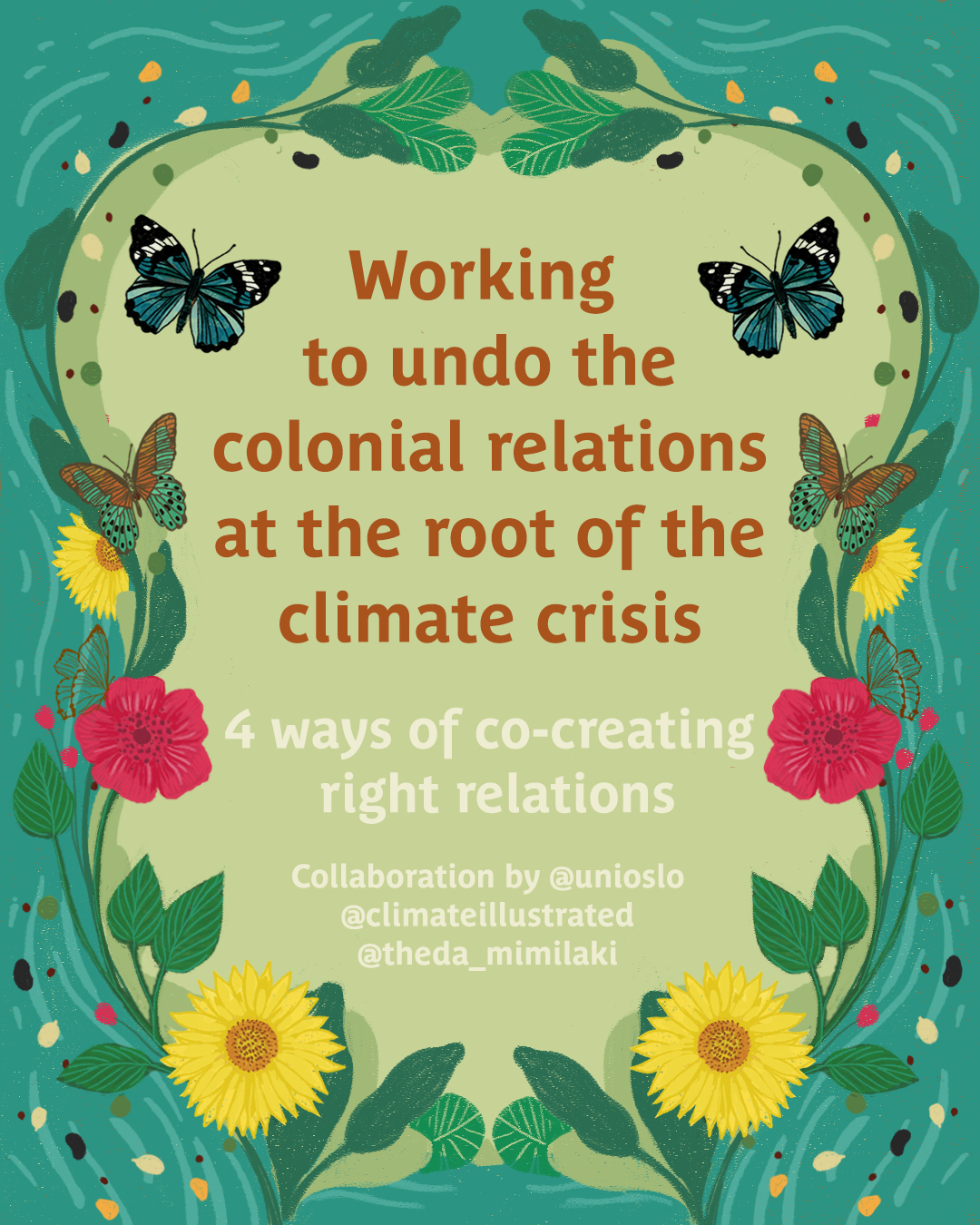
Learn more about how to undo the colonial relations at the root of the climate crisis through deep listening, self-reflexivity, creating space, and being in action.
Climate change is both a form and product of colonization. To co-create sustainable futures, we must work to undo the colonial relations at the root of climate change. As those benefiting from colonial relationships, white people have a distinct responsibility to contribute toward building ‘right relations’ with Indigenous people.
We offer an entry-point for how non-Indigenous folks, and especially white people, can engage actively in decolonization. Embodying ‘right relations’ is an active and long-term commitment to decolonize yourself and the world. This work is therefore a continuous process of becoming with no end point.
“‘Right relations’ draws on the Indigenous notion of ‘all my relations’ and is a way of being that is grounded in respectful reciprocity with all of creation.”
While the idea of ‘right relations’ comes from Indigenous thinking and activism, these ways of being are relevant to all relationships, not least with other groups that are often marginalized, such as Black people and People of Color.
About the authors and their reserach: Irmelin Gram-Hanssen, Nicole Schafenacker & Julia Bentz, a group of non-Indigenous sustainability researchers working with Indigenous communities across the northwestern parts of Turtle Island (Alaska, British Columbia and Alberta). They offer four ways to create ‘right relations’ based on their open-access article “Decolonizing transformations through ‘right relations’” published in the journal Sustainability Science. This research and outreach is part of the AdaptationCONNECTS project, funded by the Research Council of Norway (Project 250434)
About the artist: Theda Mimilaki (@theda_mimilaki) is an illustrator living in Athens, Greece. She loves drawing humans and animals in natural and surreal environments. Theda values respect for nature, diversity and all beings.
Engaging actively in decolonization
Embodying ‘right relations’ both involves the ‘inner work’ of deep listening and self-reflexivity, as well as the ‘outer work’ of creating space and being in action to actively contribute to the dismantling of colonial systems and relations.
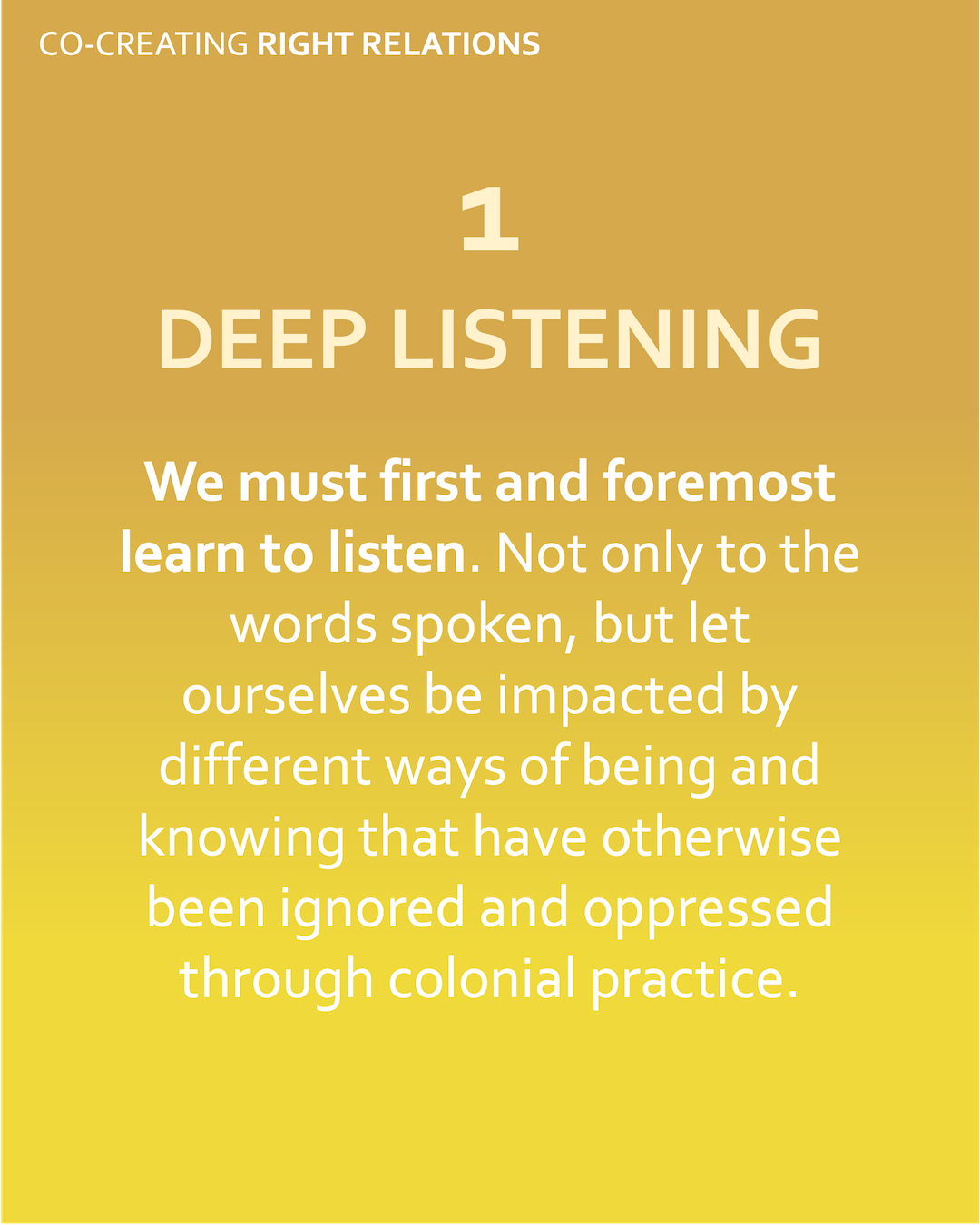
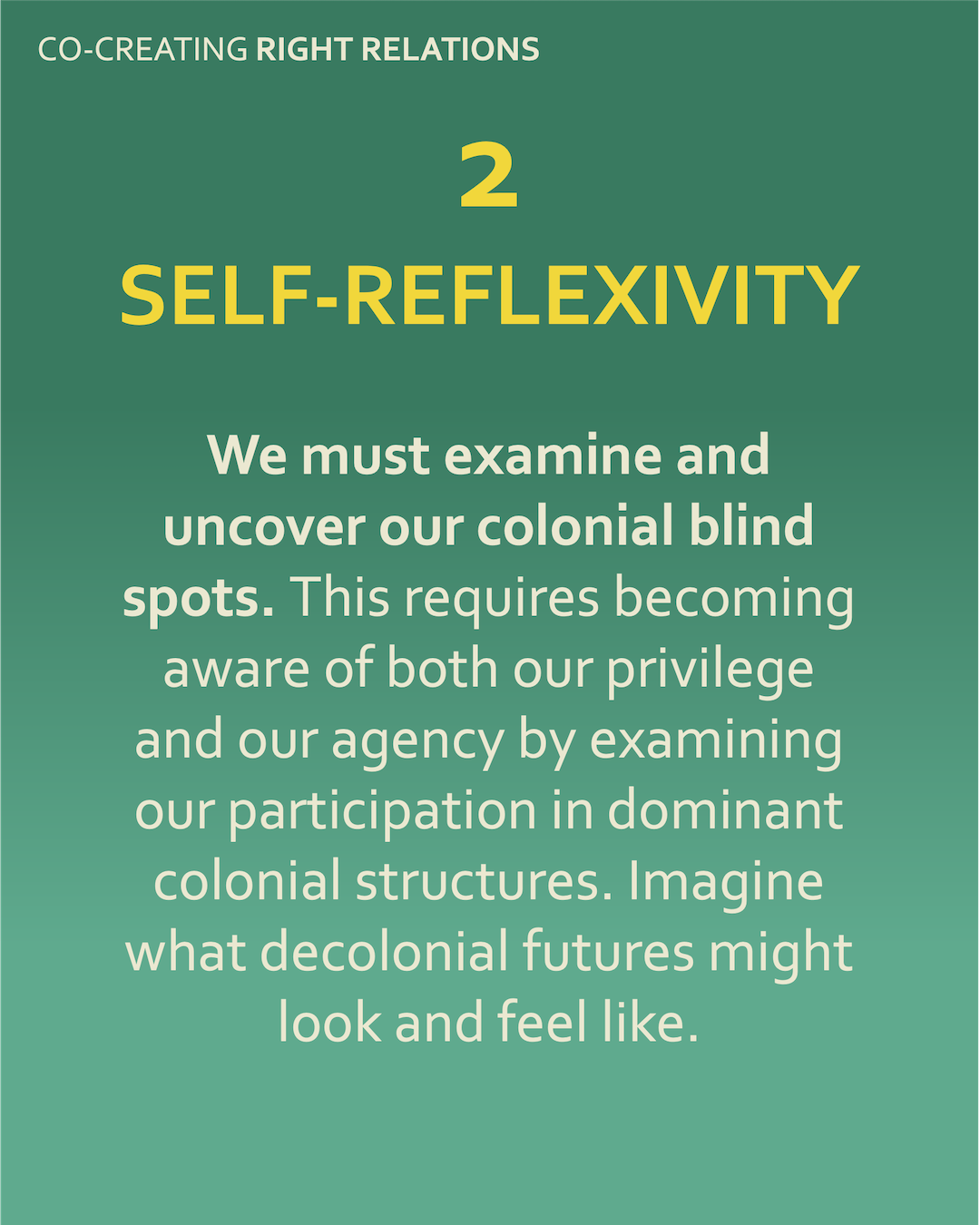
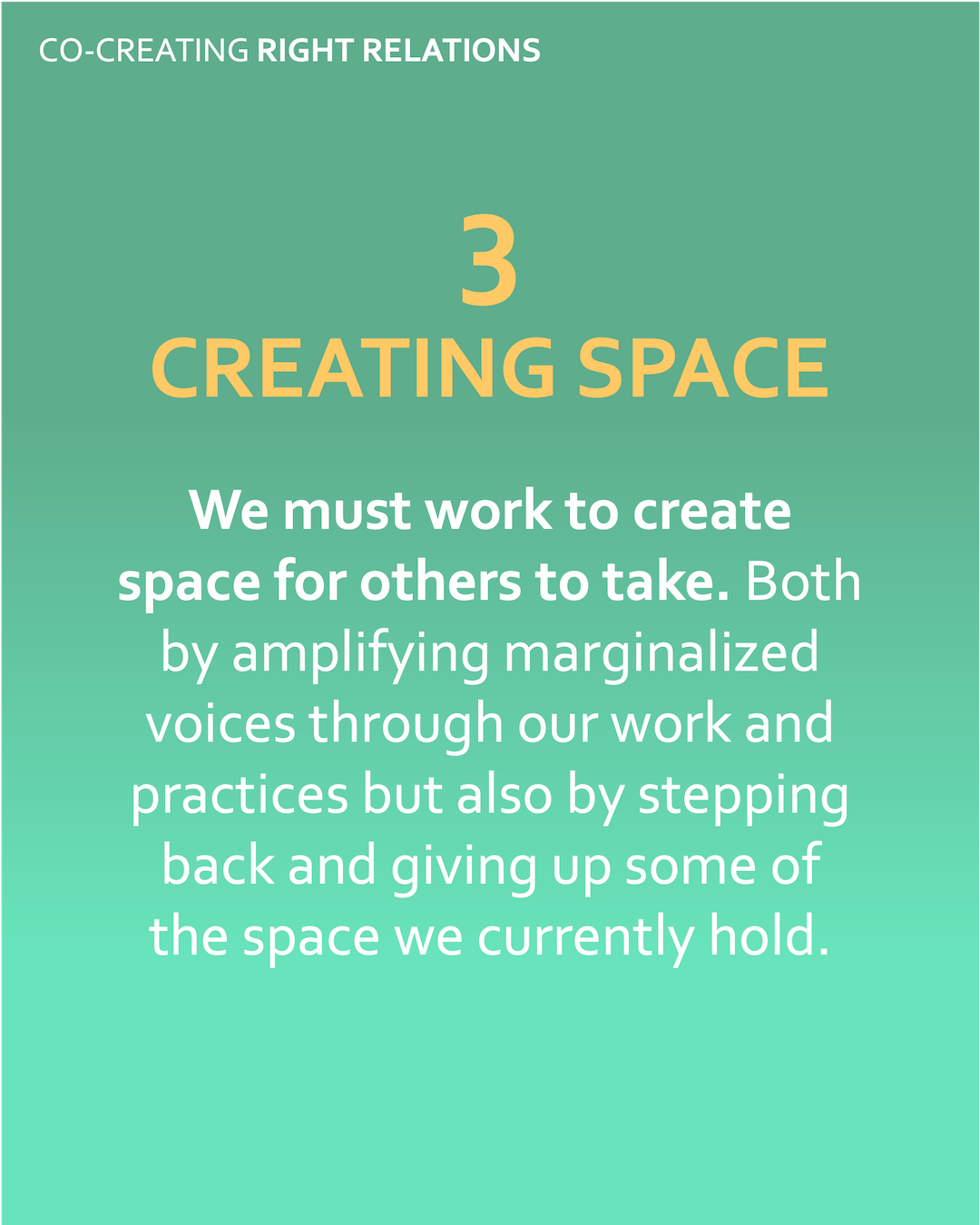
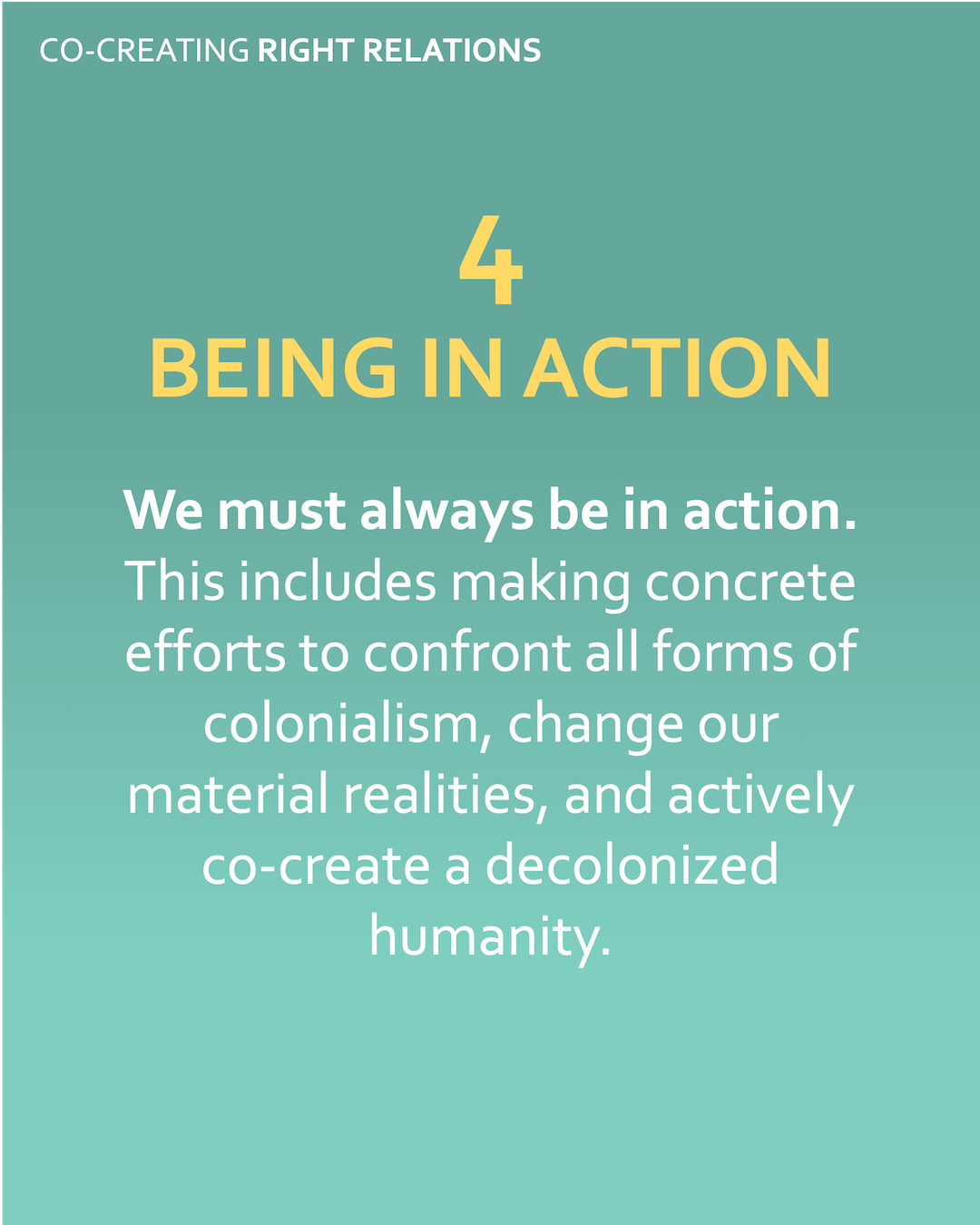
1 Deep Listening
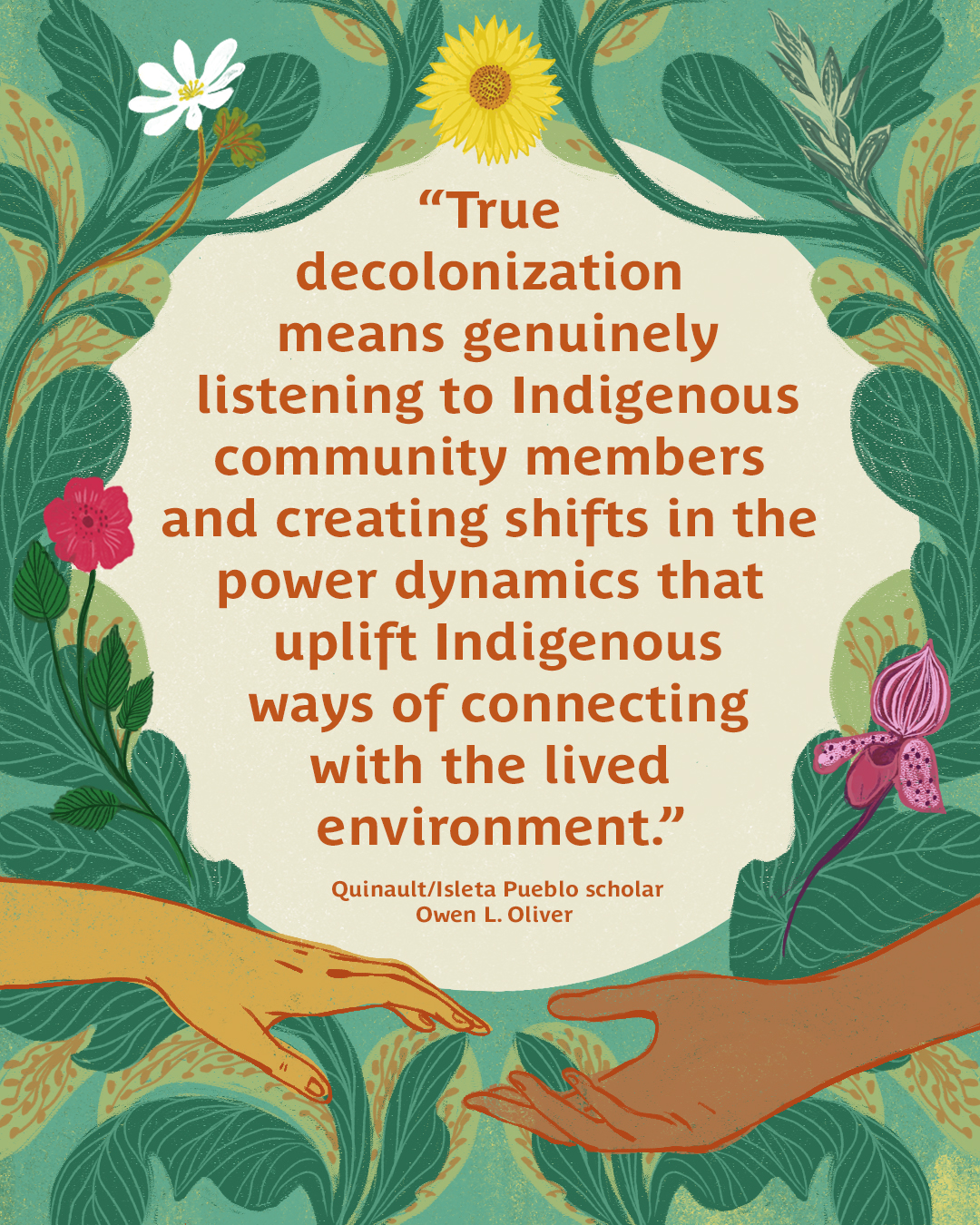
We must first and foremost learn to listen. Not only to the words spoken, but let ourselves be impacted by different ways of being and knowing that have otherwise been ignored and oppressed through colonial practice.
Embodying ‘right relations’ means repairing colonial relationships. Deep listening and present, felt, engagement are being called for as practices to build capacity for ‘right relations’.
‘Non-actions’ of bearing witness and listening deeply make space for Indigenous voices to be centered and for the weight of their experiences to truly be received by the listener.
Deep listening is different from active listening in that it goes beyond listening to the words spoken; it enters into an engagement with Indigenous paradigms, and ways of knowing and understanding the world, in a meaningful effort to think, feel, and act differently.
Rather than attempting to evaluate and translate Indigenous paradigms based on Western understandings of knowledge, an alternative is to truly relate to and learn from them. Deep listening can provide a means of doing so.
2 Self-reflexivity
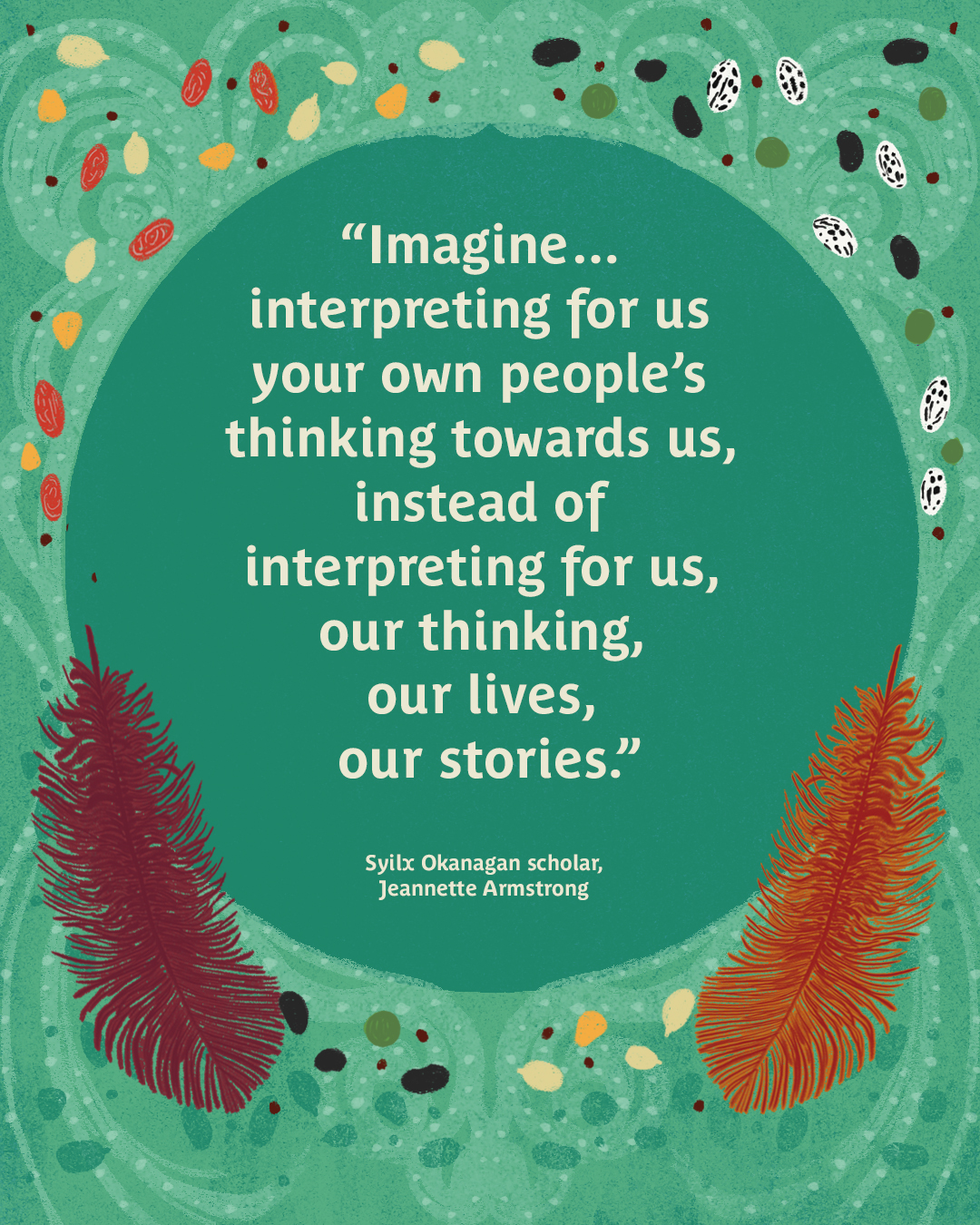
We must examine and uncover our colonial blind spots. This requires becoming aware of both our privilege and our agency by examining our participation in dominant colonial structures, and imagining what decolonial futures might look and feel like.
It is necessary to confront and disrupt mythologies of colonial benevolence and to meaningfully engage as listeners willing to be affected by the truth-telling of Indigenous peoples, Paulette Regan asserts in her book “Unsettling the Settler Within” about Indian Residential Schools, Truth Telling, and Reconciliation in Canada. This involves critically reflecting on Euro-Western hierarchical belief systems, including the emphasis on individualism.
Being reflexive about which stories we tell individually and as a culture can also be a response to the call for accountability. The act of telling or receiving a story can extend itself into fostering new enactments and ways of being. When coupling deep listening with self-reflexivity, stories can inspire action.
3 Creating Space
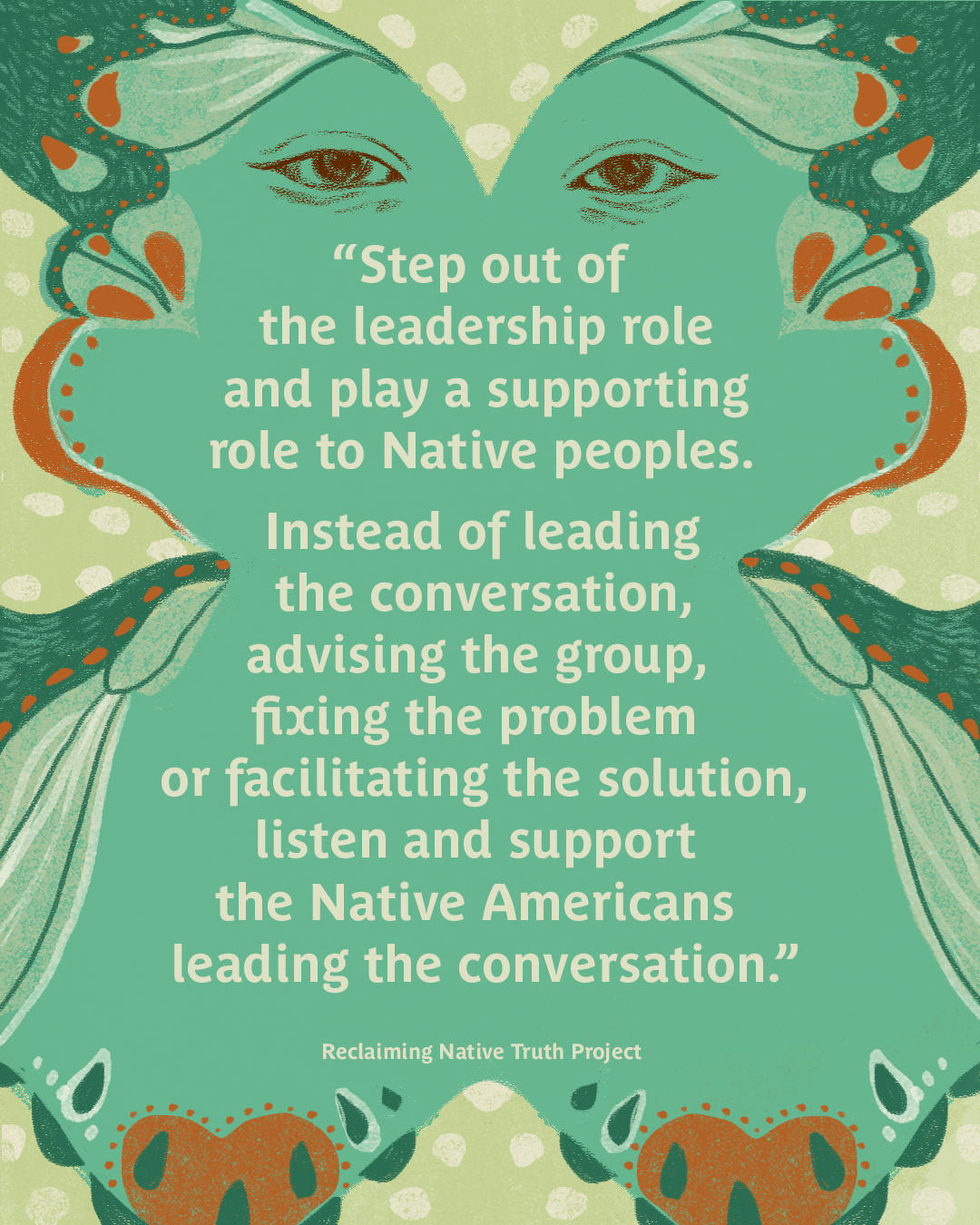
We must work to create space for others to take. Both by amplifying marginalized voices through our work and practices but also by stepping back and giving up some of the space we currently hold.
Creating space is not only about making room for Indigenous voices in one’s own work, but rather using one’s position to create space for the people behind the stories and voices to step forward.
Often the labor of raising awareness about marginalization and oppression falls on those who are experiencing it. Therefore, amplifying the voices and stories of marginalized peoples, as well as the particular knowledge systems underpinning them, can be one way of creating space and engaging in right relations — recognizing that making space for others implies giving up some of the space we currently hold.
In a more collaborative vein, space can also be created through transcultural learning via art, story and activism where Indigenous and non-Indigenous peoples can share knowledge and imaginaries of a decolonized reality. Related to this, the act of sharing a story itself is a means of creating space.
By centering and amplifying Indigenous voices and acknowledging Indigenous language and metaphors we open ourselves to deeper knowledge of our world and contribute toward dismantling the current colonial relations.
4. Being in action
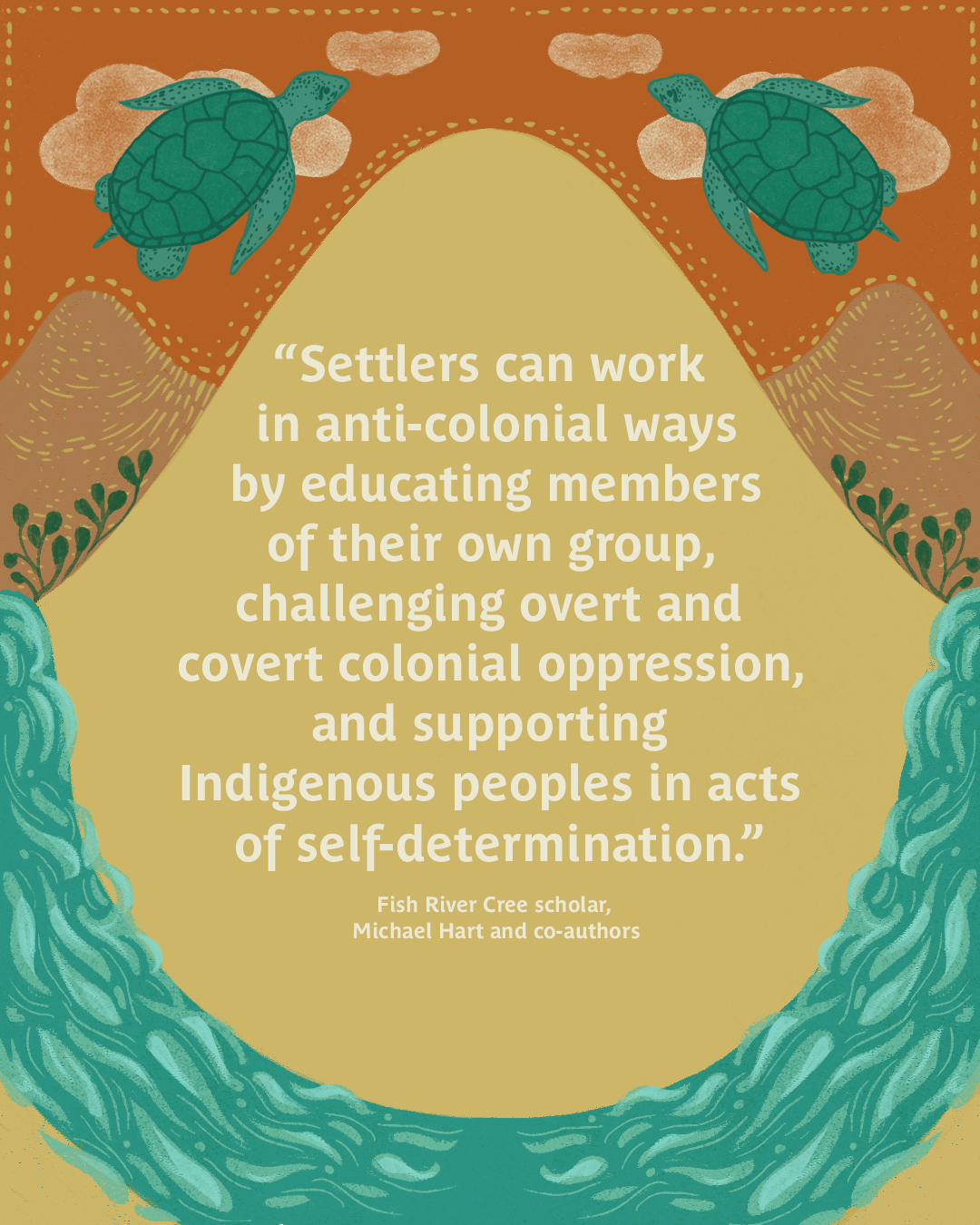
We must always be in action. This includes making concrete efforts to confront all forms of colonialism, change our material realities, and actively co-create a decolonized humanity.
By responding to the call for members of the dominant group to educate ourselves on structural injustice produced by colonization we open space for personal agency in helping to enact decolonial change. Non-Indigenous people may work to embody ‘right relations’ by fostering relationships within our communities that allow for healthier connections, generative dialogue and teaching/learning practices on inequity and systematic oppressions so that we may collectively work towards a decolonized humanity.
Practices such as land stewardship and the experiential learning of frontline activism are ways of being in action. Many traditional territories across Turtle Island have become sites of decolonial activism in the face of extractive industry. The act of bearing witness to a struggle or more directly, placing one’s body within sites of struggle in solidarity, may enact change on a material level.
These sites have the potential to become spaces where ‘right relations’ are formed and decolonial ways of creating community can begin to be enacted, however imperfectly. In short, presence matters in affecting transformative change.
As many Indigenous scholars and knowledge holders have asserted, decolonization is not just a perspective or a metaphor that informs theory, but is deeply unsettling and requires an active repair of ‘right relations’.
Resources for further learning
This is a selection of specifically relevant sources from the open-access article “Decolonizing transformations through ‘right relations’”. You can find more resources by accessing the article.
Specifically for aspiring allies
-
Changing the Narrative about Native Americans: A Guide for Allies by First Nations Development Institute, and part of the Reclaiming Native Truth Project
-
For our white friends desiring to be allies by Courtney Ariel
On colonization and climate change
-
On the importance of a date, or, decolonizing the anthropocene by Davis H, Todd Z (2017) in ACME (An International Journal of Critical Geographies)
-
Indigenous climate change studies: indigenizing futures, decolonizing the anthropocene by Whyte K (2017) in English Language Notes
Other writing on decolonization and Indigenization
-
The disempowerment of First North American Native Peoples and empowerment through their writing in gatherings by Armstrong J (1990) in the En’Owkin journal of first North American peoples, 1:141–147
-
Unsettling the settler within: Indian residential schools, truth telling, and reconciliation in Canada by Regan P (2010)
-
Decolonization is not a metaphor by Tuck E, Yang KW (2012) in Decolonization: Indigeneity, Education & Society
-
Braiding Sweetgrass—Indigenous wisdom, scientific knowledge and the teachings of plants by Kimmerer RW (2013)
-
As we have always done: indigenous freedom through radical resistance by Simpson LB (2017)
-
Towards the ‘tangible unknown’: decolonization and the indigenous future by Sium A, Desai C, Ritskes E (2012) in Decolonization: Indigeneity, Education & Society
Specifically for researchers and educators in academia
-
Working across contexts: practical considerations of doing indigenist/anti-colonial research by Hart MA, Straka S, Rowe G (2017) in Qualitative Inquiry
-
Reflecting on the Foundations of Our Discipline Inspired by the trc: A Duty to Respond during This Age of Reconciliation by Fraser, C. G., & Stevenson, A. (2021) in Canadian Historical Review
-
Decolonization Can’t Happen Without the Input of Indigenous Communities by Oliver, O.L. (2020)
-
100 Ways: indigenizing & decolonizing academic programs by Pete S (2016) in Aboriginal Policy Studies
-
Indigenous place-thought and agency amongst humans and nonhumans (First woman and sky woman go on a european world tour!) by Watts V (2013) in Decolonization: Indigeneity, Education & Society
-
Reshaping the university: Responsibility, Indigenous epistemes and the logic of the gift by Kuokkanen R (2007) in UBC Press